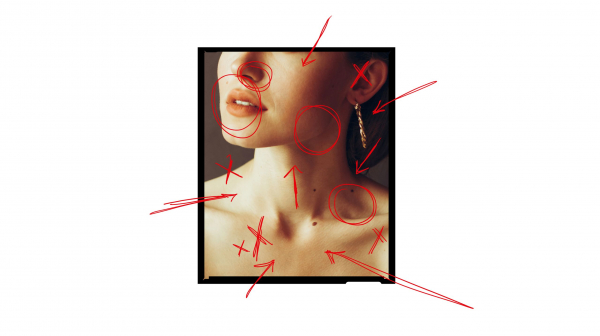 Illustration by Ingrid Fowler; Source images: Getty ImagesSave this storySave this story
Illustration by Ingrid Fowler; Source images: Getty ImagesSave this storySave this story
When I was a junior tabloid reporter back in the early 2010s, I was habitually tasked with writing stories about so-called celebrity transformations. I’d interview plastic surgeons about what cosmetic procedures they thought certain A-listers might have undergone, usually based solely on photos. They’d speculate about potential facelifts, breast augmentations, weight loss procedures, and more—even though these doctors were never the ones operating on the celebrities in question. On more than one occasion, the speculations my outlet published were later proven false.
For tabloids, this is a tale as old as time—but this doesn’t just happen in tabloids now. A surge of medical professionals have created big platforms for themselves on TikTok, Instagram, and YouTube by breaking down what cosmetic surgeries and treatments celebrities they’ve never worked on—who are overwhelmingly women—might have received. It’s a whole category of content that, much like its tabloid predecessor, comes with a near-guaranteed level of engagement—but its morality and accuracy are arguably questionable. In my opinion, it needs to stop.
Take London-based Jonny Betteridge, MBBS, who practices non-surgical facial aesthetics. He has amassed hundreds of thousands of followers on Instagram and TikTok in part by analyzing changes in celebrities’ faces—especially celebrities who are already going viral for suspected cosmetic work. (Betteridge declined to comment for this story.) Betteridge himself recently went viral after posting his theory about the procedures Khloé Kardashian might have undergone, which he speculated included a brow lift, a chin implant, a face and neck lift, an upper blepharoplasty, and lip filler. Kardashian swiftly responded in the comment section with a list of procedures and treatments she says she’s actually received: it included Botox and Sculptra where a face tumor was removed in her cheek, laser hair removal at the hairline, collagen baby threads, and a nose job, among other things.
Jonathan Kaplan, MD, a board-certified plastic surgeon in San Francisco, is also on the celebrity content train. On Instagram and TikTok, he recently complimented Taylor Swift for having “the best plastic surgery of any celebrity.” In the video, he said it’s his opinion she had a breast augmentation with 300cc silicone implants. (Swift has never publicly spoken about undergoing any cosmetic procedures.) Kaplan has also speculated about which celebrities use GLP-1 medications such as Ozempic. (Allure reached out to representatives for Dr. Kaplan for comment and did not receive a response.)
And that’s the real kicker: Looking at photos or videos to determine what cosmetic treatments someone has received “is just guessing,” says Babak Azizzadeh, MD, a board-certified facial plastic surgeon in Beverly Hills. “And your guess may be wrong.” That’s why he refuses to speculate on celebrity procedures, even through media outlets. Even if the celebrity were a patient of his, he adds, he would never want to violate their privacy. What’s more, the posts I’ve seen from medical professionals building their platforms on breaking down celebrities’ alleged surgical transformations don’t seem to adequately consider the likelihood of common, non-cosmetic explanations for perceived differences in appearance, such as lighting, makeup, hairstyling and wigs, and weight fluctuations.
And there are lessons to be learned from the tabloids; back in 2017, Life & Style published an article in which doctors reportedly speculated that Sarah Hyland had received lip injections, not yet knowing that she’d had two kidney replacements due to a chronic condition and endometriosis (Hyland discussed her health in a 2018 interview with SELF). "Not that it’s anyone’s business but I’m on a cocktail of different steroids and it has made my lips swell,” Hyland responded to the Life & Style piece on Twitter. (The publication later amended its story online, removing all references to plastic surgery and adding the line, “While the Modern Family star will agree she does look different, it's not because of plastic surgery.” Hyland wasn’t happy about that, either, taking to X to say, “why don't you just delete the article about how different I look over the past 10 yrs instead of deleting ‘drs’ comments.)
It’s not hard to see the potential problems that can arise from this public guessing game, but it seems to me that some medical content creators are so focused on engagement that they’re willing to play along. In 2022, nurse practitioner Miranda Wilson reportedly offered her opinion of how she would treat Natalia Dyer if she were her injector with chin filler, lip filler, a brow lift, and some Botox to relax her jawline and slim her face. Wilson went so far as to include a digitally altered “after” image of Dyer’s face to validate her suggested tweaks. After Dyer’s fanbase called out the post’s toxicity, she removed it and issued an apology. She has since adjusted her content to focus on generalized beauty advice and today has more than 580,000 followers on TikTok and more than 1 million on Instagram. (Wilson declined to comment for this story.)
Even when celebrities or viewers call out the inaccuracies or insensitivity of these speculations, the doctors, nurses, and injectors making the comments can still benefit from the engagement and name recognition from viral posts. Not only is Betteridge’s post about Khloé Kardashian still up, he’s since moved on to posting about Emma Stone, whose appearance is currently under an internet microscope following a recent public appearance. Betteridge told Yahoo after the Kardashian incident, “I’ve grown my following from, I think, 7,000 to over 500,000 in the space of about three years. A lot of it has come down to celebrity content.”
Contributing to this genre of content—both on social media and in tabloids—is, for the most part, frowned upon in the plastic surgery industry, says Darren Smith, MD, a plastic surgeon in New York City. “I think a lot of people do it if they don’t necessarily have other things to talk about.” As Chrissy Teigen, who often documents her plastic surgery on social media, once wrote on Instagram, “ My doctor would never, ever, hang out on Instagram and dissect people's faces … he's too busy working.”
What I find even more inane about speculating on celebrities’ work is that the targets are inarguably beautiful people. It risks sending the message that no one should settle with their natural or enhanced features because everyone could always use more. “It sets unreasonable expectations,” Dr. Azizzadeh says.
There are professionals out there who do handle celebrity plastic surgery content differently—giving insight into buzzy procedures after celebrities talk about them, for example, so people can learn more about the risks and benefits from board-certified plastic surgeons. They get bonus points in my book if they make sure to insist that no procedure is ever one-size-fits-all. “Once the information is in the public domain, it’s almost my duty to say, ‘Hey, this is radical transparency and that’s great, but it’s useless information because you should not ask for a facsimile of what they had done and here's why,'” Dr. Smith says. Posting comparable before and after images of their patients—with their permission—is also a sign they aim to demonstrate their skills rather than exploit famous strangers.
On the other hand, if a content creator has made a name for themselves by speculating about cosmetic work celebrities may have had done, it’s worth questioning their conclusions—and more importantly, what this kind of discourse says about the impossible standards by which celebrities (and, in turn, the rest of us) have to abide.
In the case of Khloé Kardashian, one could argue that she was simply following in the recent steps of Kris and Kylie Jenner in sharing the specifics of her cosmetic procedures, but would she have done so if it weren’t for Betteridge’s post? And did her transparency help us? I can’t answer either of those questions with any certainty, but I can say to the medical social media detectives: It’s time to prioritize facts and privacy rather than ego—because you might be harming your own followers as much as you’re harming the celebrities you profit off of.

